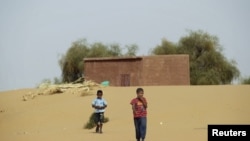DAKAR —
The United Nations Food and Agriculture Organization (FAO) says cereal harvests across much of Africa's Sahel region are expected to decline following late and erratic rains this year. The FAO warns that, as in past years, this could threaten food security in the region unless early intervention measures are taken.
The FAO says crop production in several Sahelian countries is likely to be significantly lower this year. A delayed start and early end to the rainy season caused poor grain and cereal harvests across the region.
In their latest Crop Prospects and Food Situation report, the FAO said Chad is facing the biggest decline in cereal production, nearly 25 percent. Senegal, Niger and Mali are also expected to be hard hit. In these areas, crop production is expected to fall by between 11 and 18 percent from last year.
Jean Senahoun is an economist at the FAO’s Trade and Market Division.
"What that means is that, as you know, the Sahel region has been hit by series of food crises in recent years. Starting in 2005, then 2007, 2009, and most recently, in 2012, there was another food crisis. That means that the coping capacity of the population has been really affected, it has been weakened. [People] are very vulnerable to any new production shock. So that is why we are putting out this early warning," said Senahoun.
Senahoun said that while the news isn’t all bad - harvests in the coastal countries of West Africa, such as Guinea, Nigeria and Ivory Coast, are likely to be above average - a drop in cereal production throughout the Sahel countries could threaten already food-insecure households and increase levels of malnutrition across the region next year.
"What we are saying is that the overall the production in West Africa is expected increase slightly compared to the average of the previous last five years. But even if supply is overall expected to be adequate, there are areas in these Sahel countries which will experience a drop in production and where access to food may be a problem, and this is the area we are putting emphasis on," he said.
Senahoun said that particular attention needs to be paid to the more than 300,000 internally displaced people in Mali, who fled their homes last year during that country's conflict, and the 150,000 Malian refugees still living in neighboring countries.
He noted that while experts are not yet predicting a major food crisis in 2014, interventions need to be made in each of the areas that were affected by this year's erratic rains.
Such interventions could include things like targeted food distribution, selling cereals at subsidized prices, and food-for-work or cash-for-work programs.
The FAO says crop production in several Sahelian countries is likely to be significantly lower this year. A delayed start and early end to the rainy season caused poor grain and cereal harvests across the region.
In their latest Crop Prospects and Food Situation report, the FAO said Chad is facing the biggest decline in cereal production, nearly 25 percent. Senegal, Niger and Mali are also expected to be hard hit. In these areas, crop production is expected to fall by between 11 and 18 percent from last year.
Jean Senahoun is an economist at the FAO’s Trade and Market Division.
"What that means is that, as you know, the Sahel region has been hit by series of food crises in recent years. Starting in 2005, then 2007, 2009, and most recently, in 2012, there was another food crisis. That means that the coping capacity of the population has been really affected, it has been weakened. [People] are very vulnerable to any new production shock. So that is why we are putting out this early warning," said Senahoun.
Senahoun said that while the news isn’t all bad - harvests in the coastal countries of West Africa, such as Guinea, Nigeria and Ivory Coast, are likely to be above average - a drop in cereal production throughout the Sahel countries could threaten already food-insecure households and increase levels of malnutrition across the region next year.
"What we are saying is that the overall the production in West Africa is expected increase slightly compared to the average of the previous last five years. But even if supply is overall expected to be adequate, there are areas in these Sahel countries which will experience a drop in production and where access to food may be a problem, and this is the area we are putting emphasis on," he said.
Senahoun said that particular attention needs to be paid to the more than 300,000 internally displaced people in Mali, who fled their homes last year during that country's conflict, and the 150,000 Malian refugees still living in neighboring countries.
He noted that while experts are not yet predicting a major food crisis in 2014, interventions need to be made in each of the areas that were affected by this year's erratic rains.
Such interventions could include things like targeted food distribution, selling cereals at subsidized prices, and food-for-work or cash-for-work programs.




